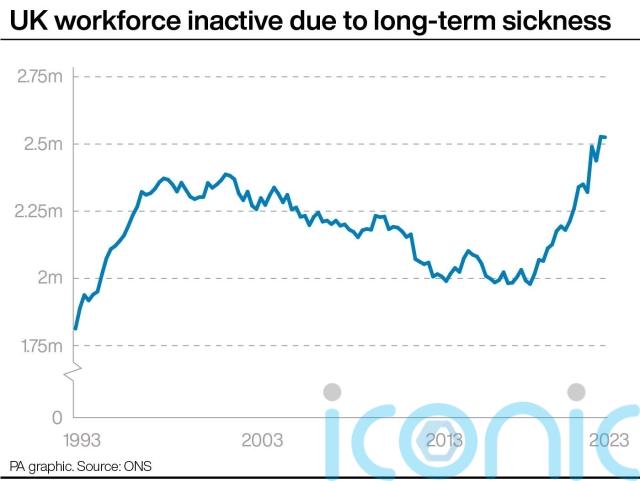
Nearly four in 10 people in the UK not able to work due to long-term sickness are suffering from multiple health conditions, a higher proportion than before the Covid-19 pandemic, new analysis suggests.
More than 2.5 million people are currently estimated to have stopped working or are not looking for work due to long-term illness, up by over 400,000 since the start of 2020.
The rise has continued even though the overall number of individuals in the UK workforce classed as “economically inactive” has been falling for several months.
38% of those economically inactive because of long-term sickness reported having five or more health conditions.
Up from 34% in 2019, this suggests that many have interlinked and complex health issues. pic.twitter.com/f256oEW91E
— Office for National Statistics (ONS) (@ONS) July 26, 2023
Some 38% of those unable to work due to long-term sickness in January to March 2023 – 937,000 people – were likely to have five or more health conditions, according to the Office for National Statistics (ONS).
This is up from 34% in the equivalent period in 2019.
The figures “suggest that many people have interlinked and complex health issues, which might mean that they have more than one health barrier to hinder their return to the world of work,” according to ONS analyst Darren Morgan.

The most prevalent condition is depression, bad nerves or anxiety, with more than half of those inactive due to long-term sickness (53%) reporting this in January to March 2023.
This compares with 12% of the working-age population as a whole.
Most of those with depression, bad nerves or anxiety reported it as a secondary health condition rather than their main one, however.
1.35 million (53%) of those inactive because of long-term sickness said that they suffered from depression, bad nerves or anxiety in January to March 2023. The majority (1.0 million) report it as a secondary health condition rather than their main one.
➡️ https://t.co/CYmnzXYAor pic.twitter.com/2jNwHxyR2m
— Office for National Statistics (ONS) (@ONS) July 26, 2023
There are “clear patterns” when looking at combinations of health conditions among people not working or looking for work due to long-term sickness, the ONS found.
More than two-thirds (70%) of those with a main health condition that was musculoskeletal in nature – such as problems with back or neck – reported having more than one type of these conditions.
Some 58% of those with back or neck problems as their main health condition also reported having issues with their legs or feet, while 56% of people with mental illness as their main health condition also said they suffered from depression, bad nerves or anxiety.
“It is for others to decide what the policy response should be, but our new figures shine a light on an important issue holding people back from returning to work,” Mr Morgan added.
Subscribe or register today to discover more from DonegalLive.ie
Buy the e-paper of the Donegal Democrat, Donegal People's Press, Donegal Post and Inish Times here for instant access to Donegal's premier news titles.
Keep up with the latest news from Donegal with our daily newsletter featuring the most important stories of the day delivered to your inbox every evening at 5pm.